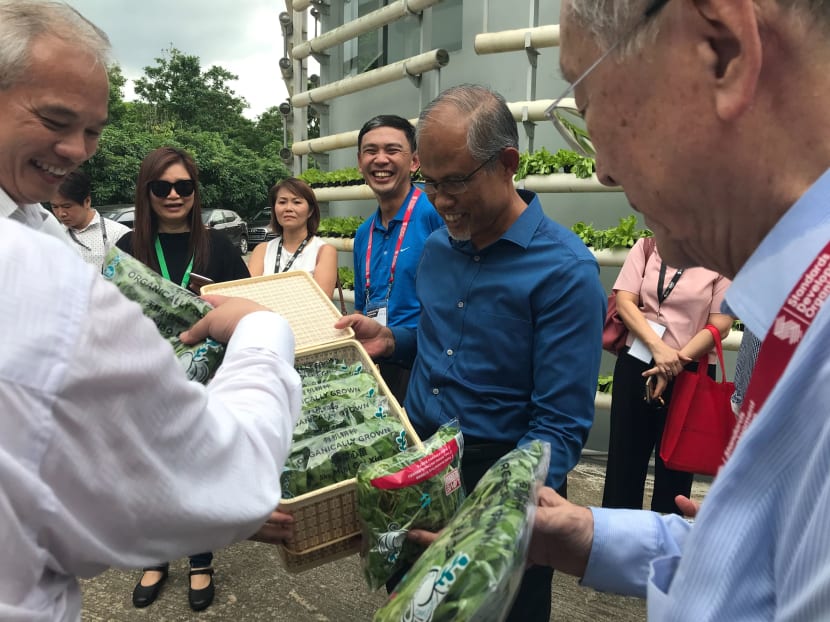More locally grown organic food in store after farm gets first-of-its-kind certification
SINGAPORE — Singaporeans are set to see more locally grown organic products in their supermarkets after a vegetable farm in Lim Chu Kang took a vital step towards meeting fast-growing demand here for clean, green food.

The development of the national standard for green and sustainable farming practices is a step closer to Singapore’s “30 by 30” vision of producing 30 per cent of the nation’s nutritional needs locally by 2030, unveiled by the Ministry of Environment and Water Resources in March.
SINGAPORE — Singaporeans are set to see more locally grown organic products in their supermarkets after a vegetable farm in Lim Chu Kang took a vital step towards meeting fast-growing demand here for clean, green food.
The farm, operated by Sky Greens, is Singapore’s first farm to secure a new national standard for organic primary produce grown in or near an urban area. The farm received the SS 632 Certification on Tuesday (June 11) at a ceremony attended by Environment and Water Resources Minister Masagos Zulkifli.
NTUC Fairprice director of food quality and safety, Ms Chong Nyet Chin, said Singaporeans’ expanding disposable income, increasing health concerns and consumer awareness are some of the drivers behind the proliferation of the local organic market.
She said consumers here increasingly want to “go for green, go for local and go for niche”.
“Healthy living and ageing is a top priority in Singapore. So fresh and organic products will be the push for the consumers to aspire to better health and living, which will be the continued driving force that pushes Singapore’s organic trend.” Ms Chong said at the certification event.
The development of the national standard for green and sustainable farming practices is a step closer to Singapore’s “30 by 30” vision of producing 30 per cent of the nation’s nutritional needs locally by 2030, unveiled by the Ministry of Environment and Water Resources in March.
The SS 632 is said to be the world’s first national standard for organic primary produce grown in urban — or near urban — environments, tailored to Singapore’s farm settings. It was supported by the Singapore Manufacturing Federation — Standards Development Organisation.
Mr Masagos said the certification on Tuesday “will be followed by many, many more, as our farms continue to transform themselves to tap the latest market opportunities”.
Firms such as Japan’s Panasonic, which operates an indoor farm at its premises in Jalan Ahmad Ibrahim, are also said to be interested in attaining the SS 632 certification.
The chairman of Sky Greens, Dr Ngiam Tong Tau told TODAY that the strive towards satisfying the SS 632 certification requirements had helped the farm to focus on areas where they can implement more sustainable methods.
“When we set up our farm, our intention was to practise organic farming, but because of our environment, it was difficult for us and the Singapore Standards Council helped us as they not only cater to traditional farms but also cater for ethical farms.”
The farm grows a range of green vegetables such as Chinese cabbage, spinach, kai lan and kang kong.
The certification is administered by Enterprise Singapore and was overseen by the Singapore Standards Council’s (SSC’s) Food Standards Committee. It was developed after local farms worked to address challenges in farming here such as limited space for agriculture, a lack of natural resources, higher operating costs due to energy consumption and manpower constraints.
To achieve the certification, farms must meet the requirements for sustainable farming practices, including the use of rainwater, use of living substrate or growing media, and having an enclosed area for farming that limits potential contamination and pollution from the environment.
These standards apply for agricultural products such as grains, mushrooms, fresh vegetables, fresh herbs and fresh fruits, covering processes such as production, post-harvest practices, import, packing and repacking, storage, transport and labelling of organic produce.
The chairman of the SSC’s Food Standards Committee, Mr Allan Lim, told TODAY that Singapore has a unique farming infrastructure and capacity, especially with the nation’s “expiration date for us to be self-sufficient” and “to be competitive with our neighbouring countries”.
With the lack of land space and consequently less competitive prices in Singapore, Mr Lim said that the certification allows farms to be “more competitive”, making them appeal to a niche market which consumers are increasingly opting for.
Mr Masagos said consumers “play an important role in helping our local agri-food industry to grow”.
“When we buy more local produce, the demand enhances the commercial viability of our local farms, and leads to economies of scale. This allows local farms to invest more in technology and develop further,” he said.






